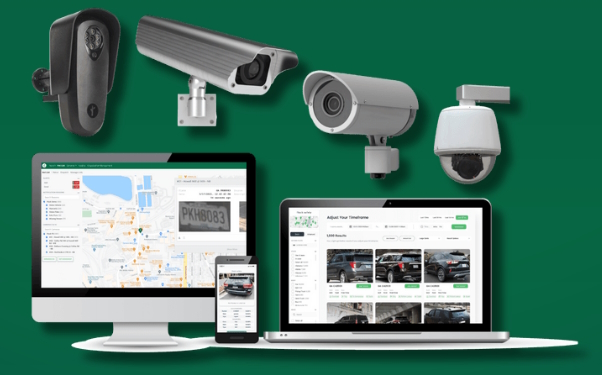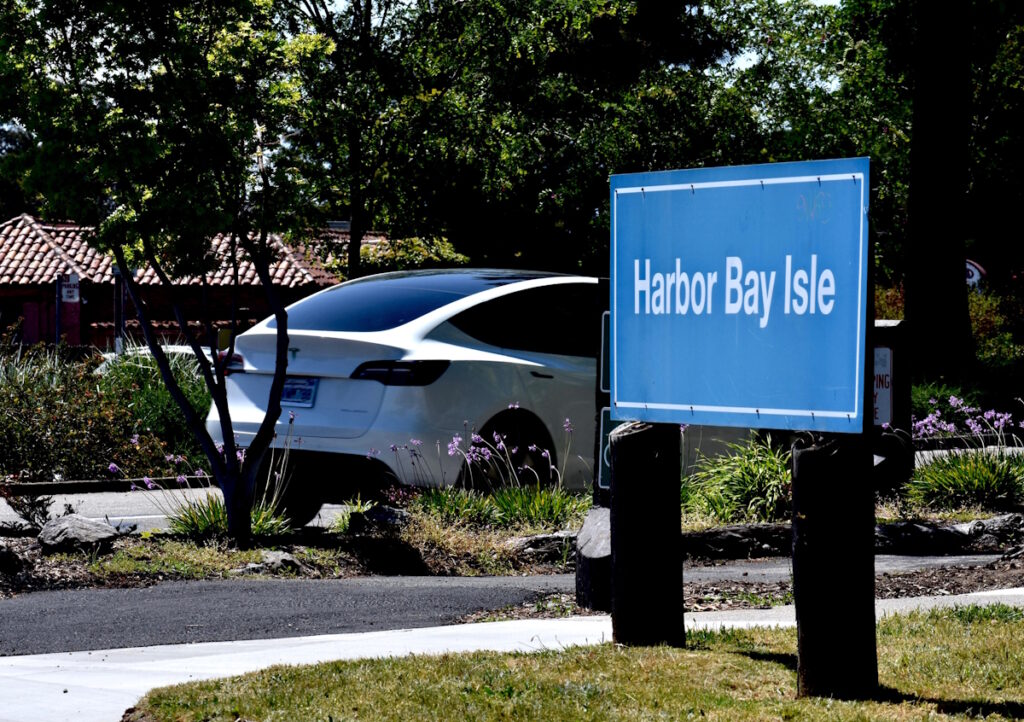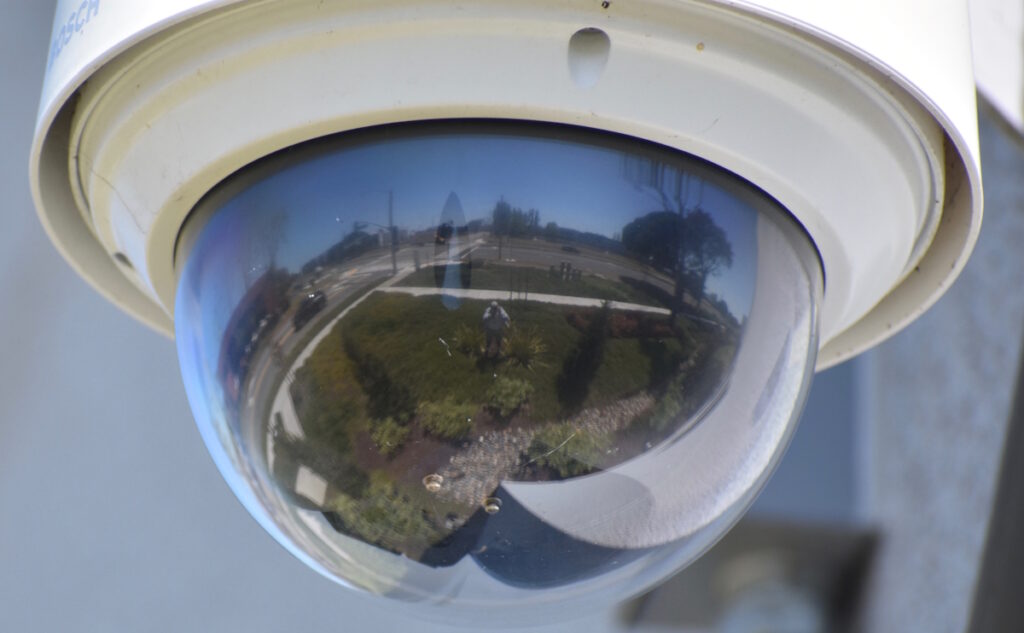A Private Eye Of Sorts, Namely Video Security Cameras Owned And Operated By HOA’s May Be Deployed
By Larry Freeman
Various Harbor Bay Isle (HBI) HOA’s are in the midst weighing the pros and cons of placing HBI owned and operated Photo and video security cameras.

Michael Robles Wong, President of The Costa Brava HOA, one of twenty eight at HBI, is helping to spearhead the potential addition of FLOCK Safety devices to allow Community Of Harbor Bay Isle Security to review photos and video footage that is suspicious or could be evidence of criminal events.
At the invitation of HBI HOA’s, Alameda Police Lieutenant, Josh Crossley, met with key members of most of the HOA’s at HBI and discussed the parameters for private drone deployment and how APD could collaborate with HBI’s private security force with respect to reviewing and obtaining various types of evidence captured by the devices.
APD would not have direct access to any of the content captured by HBI security cameras, save for license plate data, but could review it in the context of crime solving after it had been reviewed and found relevant by trained and certified HBI Security specialists.
That would give APD added evidence to help track the paths of suspicious vehicles and obtain license plate number, make, model of the vehicle and so on to coordinate with City authorized cameras which APD routinely uses with substantial success.

Typically, such devices as HBI is considering are located at key ingress and access points of which the HBI community has more of than the ‘main island.’
Robles-Wong acknowledges that most criminal activity taking place in the HBI community are “mostly low level crimes involving mail theft, porch piracy and car” related incidents.
That said, an entry in the latest edition of HBI’s quarterly community magazine, “The Gull, ” underscores that HBI residents have a very high expectation for security that is not being adequately met.
“Although we would like to think that Harbor Bay is insulated from crime and that our Security patrols effectively deter criminals from entering our area, this is sadly not the case,“ it says, in part.
Robles Wong echoed that sentiment, saying “we’re not used to seeing this level of petty crimes out here.”
That said HBI, by one measure, incurred 6 car thefts between April 5th through May 5th of this year compared to over 50 across the main island.
When it comes to petty thefts during the same period, HBI suffered 5 such incidents compared to well over 60 on the main island.
What might have been the straw that fed the perception that crime was getting out of control in the area came early in 2024 with an incident that had more repercussions than frustration with the smaller stuff.
Robles-Wong said that a confrontation late one night with an alleged criminal who opened up the door and walked into a resident’s garage became the spark for beefing up security at HBI, despite it being the least crime impacted area in Alameda.
This one involved something more provocative and bold than the usually stealthy ones that the HBI community has to contend with.
The resident said, in a private discussion, that he heard the noise of his garage door being opened, jumped out of bed and darted to the home’s garage access door.
Upon opening it, he looked straight into the eyes –just an arm’s length away–of a menacing individual, dressed fully in black, face mostly covered up by a head-mask.
Not knowing the person’s intent and fearing for his safety and that of his wife, he screamed at the top of his lungs and said words to the effect that “if you don’t get out of here I’m gonna ——-‘in kill you!”
Fortunately for the resident, the individual bolted from the garage, jumped into the open door of a black vehicle located at the end of the driveway and sped away into the dark of night.
The resident, a truly amiable and gentle person by nature, confided that he was utterly petrified in the moment but he thought that if he just seemed to have more bravado and could make himself ‘bigger’ that the suspected crook, he might have a chance to come out unscathed, which he did except for his nerves.
News of the incident did not make it into “The Gull” but it blazed around via social media.
Aware of the incident himself, Robles-Wong said he thought that “we can’t sit on this. We have to do something,” though he acknowledges that any decision to move ahead on the proposal would be “ a community decision. It’s not my personal say.”
While constraints on what information can be obtained by the devices are less stringent than those imposed by The City on APD — for example, the duration of information captures, a crime in progress and the possible collection of facial recognition data—there are still filters that kick in with respect to what APD can lawfully use when provided the private HBI captures.
APD could be granted automatic access to add to its LPR capacity, but a specially trained HBI Security person or persons would have to select and provide other potential evidence for independent release to APD.
In such cases, the HBC Security person would become the equivalent of a private person providing their own captures from a cell phone, Ring camera etc. and that information can be entered into the ‘chain of evidence for police to build a case.
Such private security/police partnerships have precedent in Alameda, for example with the local Corica golf course which deploys FLOCKS, as well as with Target and an HOA on the West End.
Having “consistency” with respect to any purchase and deployment of the devices is key, said Robles-Wong who noted that deterrence is a key goal of the idea. “
You need to get criminals to go somewhere else,” he said, and that means posting signs with the uniform messaging that prospective crooks are under surveillance.
A few residents have expressed “concerns” about forming a formal “partnership with law enforcement” above and beyond what now exists with HBI’s private security, said Robles-Wong. One indicated a reluctance to have their personal vehicle’s license plate read by a private FLOCK, notwithstanding it being tracked by City authorized LPR’s.
Individuals can have personal plates not recorded by the FLOCKs upon request, though that would make the vehicle less protected from recovery after a theft.
Recognizing those views is key, Robles-Wong said, adding that any move forward would have to involve first forming a “safety committee” to hammer out policy details and protocols.
Nonetheless, he said, speaking for himself, “ we need a higher level of protection ; we need added private eyes,” while acknowledging that, it’s very preliminary at this point.”

